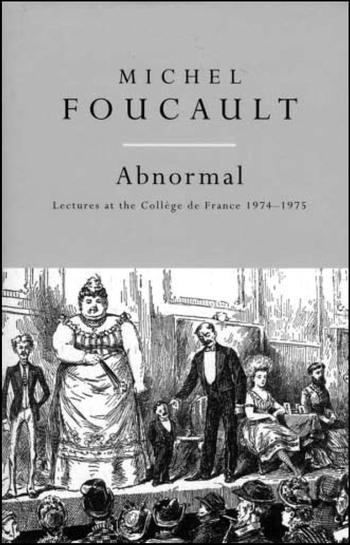
This book comprises the text of eleven lectures given by Michel Foucault at the Collège de France in 1974 and 1975. The author's first work to be translated into English was his Histoire de la Folie, published in 1972 as Madness and Civilisation . This first book was seen as part of the anti-psychiatry movement both by those in favour of the movement and by those against it. For the latter, it was a nihilistic text. The first two lectures in Abnormal will do nothing to change the minds of those who hold this view; they present contemporary forensic psychiatry in a very unfavourable light.
The book, however, is full of Foucault's erudition, especially with respect to history. He traces the development of the ‘abnormal individual’ from three sources in the 18th and 19th centuries: the monster (physical and criminal), the incorrigible criminal and the masturbating child. For all of these, he argues, psychiatry has claimed a knowledge and power. Particularly interesting is his explanation of how expert psychiatric opinion came to occupy a pivotal place in judicial decisions. Because the courts came to be unsettled by crimes without reason or motive, psychiatry had to reorganise itself to be the bearer of expertise. It therefore adopted a double role: first, that of a branch of public hygiene which protected the social body from danger, and second, that of a branch of medicine that could predict motiveless crimes, explain them and render their perpetrator curable. When these two functions came together, the medico-judicial complex became concerned with explaining the criminal and not the crime.
Foucault characterises his historical analyses as ‘histories of the present’. This means that they do not assume a linear path of progress from the ‘dark ages’ to the ‘enlightenment’ of today; rather, he tries to shed light on the present by taking periods and case studies from history that are particularly pertinent to the development of contemporary life with all its flaws. The problem with this book is that the ‘present’ of Foucault's France in 1974 is not what confronts us in psychiatry today. The ‘history of the present’ always has to be rewritten. So, despite the fact that neuroleptic agents were first developed in France in the 1950s, Foucault is silent on the subject of psychiatric drugs. It would be difficult in 2004 to maintain such a silence. Whatever one may think about medication, psychiatric drugs are integral to the landscape of our present. They cannot be avoided, however much some users would like to do so. A new book by Foucault is expected presently and this may deal with some of my criticisms.
Should psychiatrists take the time to read this book? Only if they want to be challenged. It is densely written, and likely to be uncomfortable for professionals to take on board. Nevertheless, it is full of historical detail and scholarship, and I imagine that everyone would find something to take from it.



eLetters
No eLetters have been published for this article.